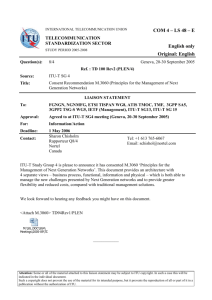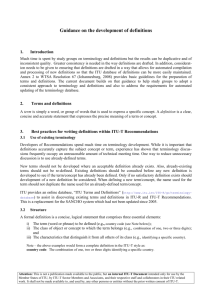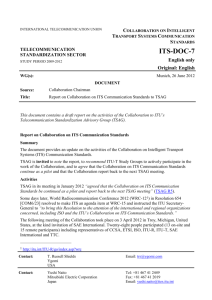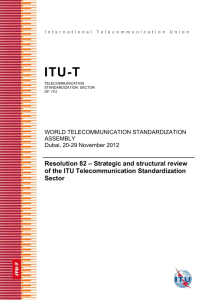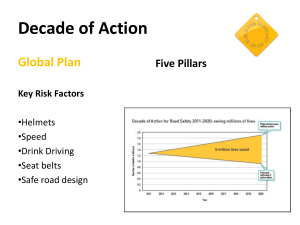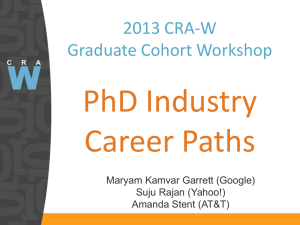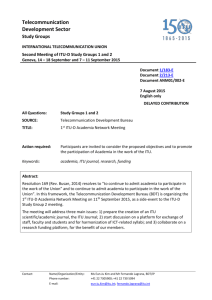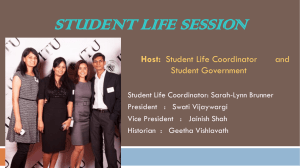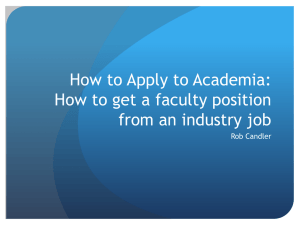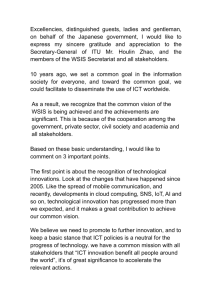XX Meeting of PCC.I
advertisement
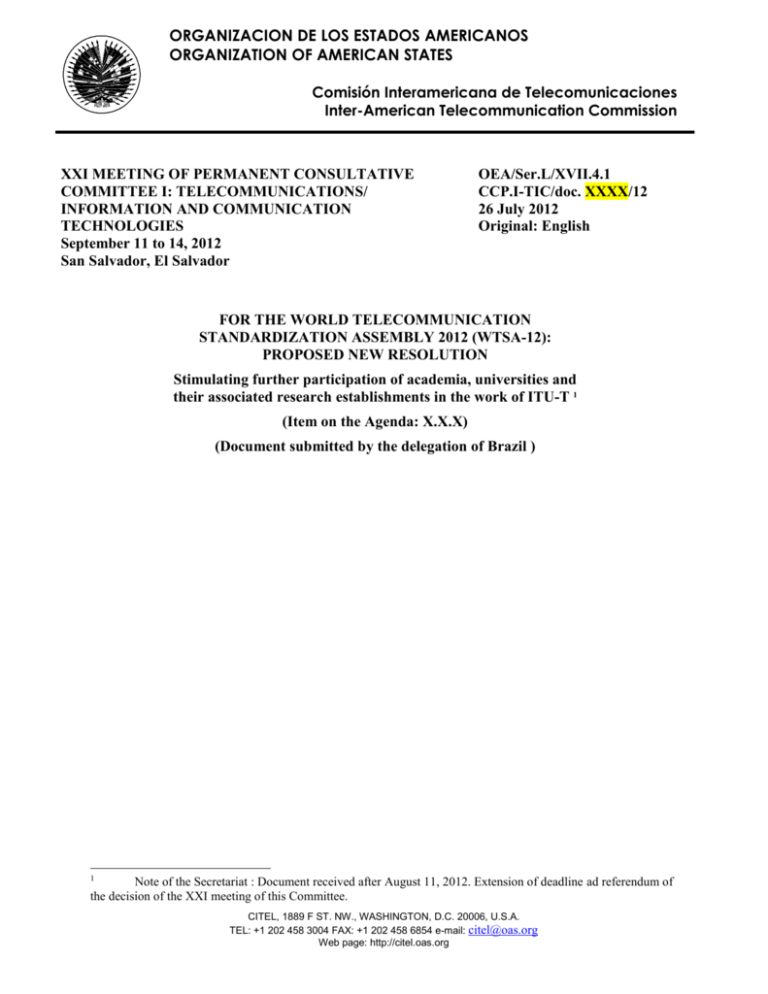
ORGANIZACION DE LOS ESTADOS AMERICANOS ORGANIZATION OF AMERICAN STATES Comisión Interamericana de Telecomunicaciones Inter-American Telecommunication Commission XXI MEETING OF PERMANENT CONSULTATIVE COMMITTEE I: TELECOMMUNICATIONS/ INFORMATION AND COMMUNICATION TECHNOLOGIES September 11 to 14, 2012 San Salvador, El Salvador OEA/Ser.L/XVII.4.1 CCP.I-TIC/doc. XXXX/12 26 July 2012 Original: English FOR THE WORLD TELECOMMUNICATION STANDARDIZATION ASSEMBLY 2012 (WTSA-12): PROPOSED NEW RESOLUTION Stimulating further participation of academia, universities and their associated research establishments in the work of ITU-T 1 (Item on the Agenda: X.X.X) (Document submitted by the delegation of Brazil ) 1 Note of the Secretariat : Document received after August 11, 2012. Extension of deadline ad referendum of the decision of the XXI meeting of this Committee. CITEL, 1889 F ST. NW., WASHINGTON, D.C. 20006, U.S.A. TEL: +1 202 458 3004 FAX: +1 202 458 6854 e-mail: citel@oas.org Web page: http://citel.oas.org Considering that the World Telecommunication Standardization Assembly 2012 (WTSA-12) has been already scheduled to take place from 20 to 29 November 2012, in Dubai, United Arab Emirates; Considering that the Americas Region WTSA-12 Preparatory Meeting was held on September 2012, in San Salvador, El Salvador, aiming at coordinating the views of the region on issues considered to be of particular relevance for consolidation and presentation as regional proposals at the WTSA-12; Considering that the Brazilian Administration presented at the Americas Region WTSA-12 Preparatory Meeting some preliminary views, identifying appropriate actions and references for the review of Resolutions approved by the WTSA-08; The Brazilian Administration hereby presents its contribution for proposes a new Resolution with the objective of further promoting the participation of the academic community from ITU’s Member States. 1 Introduction The participation of Academia on the activities of ITU’s Telecommunication Standardization Sector (ITU-T) has been shown to be fairly effective and advantageous for both sides. ITU-T can count on motivated professors and students that are avid to further develop their research work and the Academia, in its turn, has the opportunity to exchange experiences with worldwide experts and keep itself updated with the latest technology trends in telecommunications. The Brazilian Administration believes that the academic environment is a conducive space for research development on matters under discussion in ITU-T and sees in the Academia participation an opportunity to leverage the development of telecommunication and information technology sector. Moreover, academic research on telecommunications should always take into consideration the standards and regulations already established by ITU-T, since it should be harmonized with technology development around the world, besides being responsive to market’s needs. However, academic participation in ITU-T is frequently hampered due to the production requirements imposed by R&D funding agencies of the Member States, especially in developing countries. Those agencies usually demand researchers’ time and effort on many productivity items that do not value contributions to international standardization bodies in their mechanisms to evaluate the scientific production of a researcher or institution. This contribution proposes mechanisms to increase visibility of significant contribution to the development of standards, which could make standards development count towards the production objectives required of academia. 2 Background CITEL, 1889 F ST. NW., WASHINGTON, D.C. 20006, U.S.A. TEL: +1 202 458 3004 FAX: +1 202 458 6854 e-mail: citel@oas.org Web page: http://citel.oas.org ITU has been encouraging and easing Academia membership, seeking to set up a broader forum for discussions on established and innovative technologies. In this sense, ITU has already introduced a new membership category for Academia, Universities and Associated Research Establishments. In this sense, by Resolution 71 (Johannesburg, 2008), ITU resolved to instruct the Director of the Telecommunication Standardization Bureau to explore and recommend various mechanisms, such as the use of voluntary financial and in-kind contributions, to encourage cooperation between ITU-T and academia, universities and their associated research establishments, as well as any possible additional modalities to facilitate their greater participation in the work of the Sector and to invite the ITU Council to consider the admission of academic institutions, universities and their associated research establishments in the work of ITU-T as Sector Members or Associates, at a reduced level of financial contribution, particularly academic institutions of developing countries. Nevertheless, even though there are more than 45 academia members in ITU today, effective Academia participation in ITU-T is still low, considering the total number of contributions from all membership categories. On the other hand, productivity of academic researchers is constantly evaluated for many purposes, which include the assessment of undergraduate and graduate programs of their institutions, the approval of their project proposals by funding agencies and their career progression. This production evaluation, which usually takes the form of scoring items that include books, papers and patents published, courses taught, thesis advisor roles, and research projects accomplished, usually does not take into consideration the authorship of contributions to ITU-T nor the editorship of study group deliverables such as Recommendations, Supplements and Technical Papers. This way, the effort applied to write and present contributions to ITU-T does not count towards grants and career progression for Academia members, which may be obliged to prioritize other activities in order to meet the requirements imposed for the evolution on their careers. Further incentive mechanisms are therefore necessary to make key standardization processes such as contribution and editorship more attractive to Academia members. 3 Proposal Brazil proposes a new Resolution with the objective of further promoting the participation of the academic community from ITU’s Member States. In Brazilian Administration’s opinion, ITU should act closely to its Member States and their respective agencies that formulate public policies in the areas of education, science & technology and industry & commerce, in order to: Document1 06.02.16 2 Highlight the importance of contributions to and editorship of ITU’s standardization documents; Highlight that contributions and documents go through intense revision and discussion in a forum composed of experts from telecommunication leading companies and institutions; Request their consideration for the inclusion of contributions and editorships in their list for R&D productivity analysis. Moreover, the Brazilian Administration suggests that ITU-T modify the publication procedures for its standardization documents, including Recommendations, by acknowledging somewhere in each document detailed information about its editorship and main contributors, so that the needed identification is kept for the purpose of productivity analysis. In this sense, the Brazilian Administration proposes the following new Resolution: Document1 06.02.16 3 DRAFT RESOLUTION Stimulating further participation of academia, universities and their associated research establishments in the work of ITU-T (Dubai, 2012) The World Telecommunication Standardization Assembly (Dubai, 2012), considering a) that ITU’s Standardization Sector (ITU-T) has been encouraging and easing the membership of Academia, Universities and associated research establishments, seeking to set up a broader forum for discussions on established and innovative technologies; b) that the participation of Academia, Universities and associated research establishments in ITU-T is still low, considering the total number of contributions from all sectors; c) that the productivity of professionals from Academia, Universities and associated research establishments is constantly evaluated for many purposes, which includes the assessment of undergraduate and graduate programs of their institutions, the approval of their project proposals by funding agencies and their career progression; d) that, in general, the productivity evaluation of professionals from Academia, Universities and associated research establishments takes the form of scoring items that include books, papers and patents published, courses taught, thesis advisor roles and research projects accomplished; e) and that neither the authorship of contributions to ITU-T documents nor the editorship of recommendations and technical papers are considered for the productivity evaluation of professionals from Academia, Universities and associated research establishments. resolves to instruct the Director of the Telecommunication Standardization Bureau 1 to promote the value of active participation by Academia members into the ITU standardization activities by acting closely with its Member States and their respective agencies that formulate public policies in the areas of education, science & technology, and industry & commerce, in order to i) highlight the importance of contributions to and editorship of ITU’s study group deliverables; ii) highlight that contributions and documents go through intense revision and discussion in a forum composed of experts from telecommunication leading companies and institutions; and iii) request their consideration for the inclusion of participation in to the contributory process and editorships in their list of eligible activities for R&D productivity analysis. 2 to include in the layout of Recommendations and other ITU-T publications, a clear acknowledgement of the significant contributors to the development of such publications (e.g. editorship, authorship of significant contributions, etc.). 3 to define, in consultation with the ITU membership and Academia, objective criteria that will guide study groups in identifying such significant contributions. Document1 06.02.16 4
